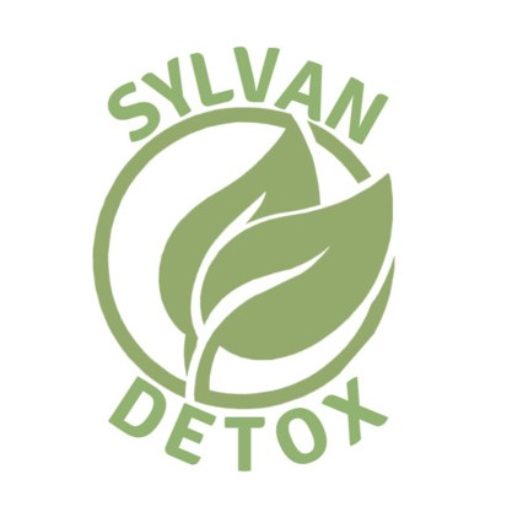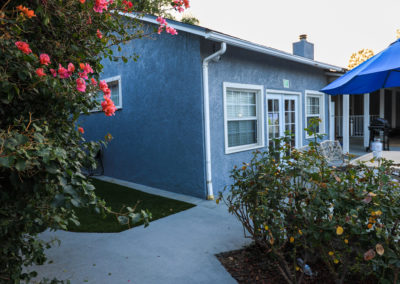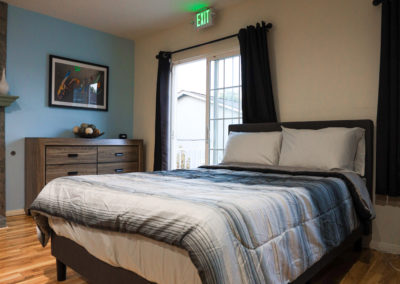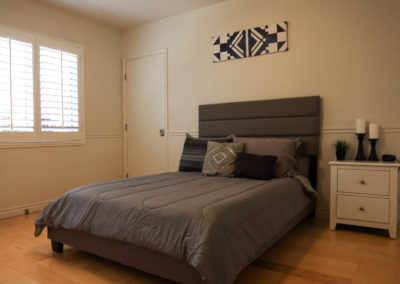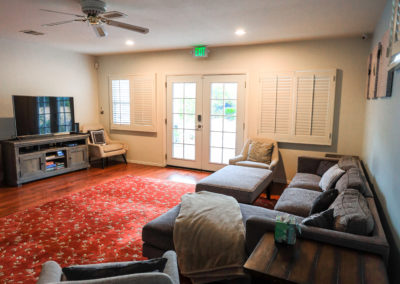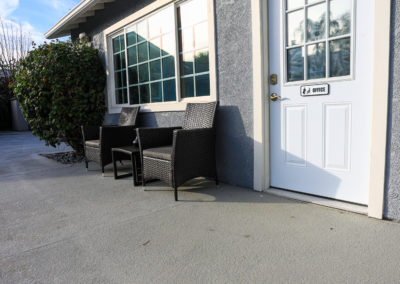Top-Rated Medically Assisted Treatment Program in Beverly Hills
Individuals struggling with drug and alcohol addiction, initially struggle with stopping substance abuse due to extremely uncomfortable withdrawals and intense cravings. Medically assisted treatment programs in Beverly Hills at Sylvan Detox can help those who are ready to quit substance abuse but have been unsuccessful on their own in the past. Medications and around-the-clock care can help reduce or even eliminate withdrawals to make the detox process significantly easier.
Medically assisted treatment can be used throughout the recovery process. While various psychotherapies can help uncover and heal the underlying causes of addiction, it can take several weeks or months to see results. Medications can be used to ease co-occurring disorders such as anxiety and depression while the patient learns and implements healthier coping mechanisms. Medications can also help ease other lingering withdrawal symptoms seen in a post-acute withdrawal syndrome.
While MAT is an important tool in substance abuse and recovery, it is only one part of a comprehensive treatment program. Sylvan Detox in Beverly Hills offers top-rated drug and alcohol addiction treatment. Our programs incorporate various therapies and services to help patients gain control of their substance abuse and find long-term recovery. Medical detox will use various FDA-approved medications to ease withdrawals and cravings, prescription medications like beta blockers to keep vitals in check, psychiatric drugs to calm the nervous system and reduce the risk of hallucinations, and holistic therapies to ensure safety and comfort during drug detox.
After completing drug detox, patients can easily transition into our rehab programs. Our multidisciplinary staff are trained in a wide range of addiction treatment modalities to create individualized treatment plans that address every unique issue of substance use disorders. Therapies you can expect at Sylvan Detox include cognitive and dialectical behavioral therapies, family counseling, 12 step counseling, holistic therapies, vocational and life skills training, relapse prevention, and nutritional and exercise counseling.
What Is MAT?
Addiction is a physical, mental, and emotional state of mind that can result from the repeated use of drugs or alcohol. When you’re addicted to something, it means you’ve become dependent on it. If you’re addicted to a substance or behavior, your brain craves the substance or behavior to the point where normal functions are impaired by its absence.
The first step of addiction treatment is going through detox. Detox, also known as detoxification or withdrawal, allows your body to rid itself of the chemicals and substances that lead to your addiction in the first place. By removing these harmful substances from your body, detox also allows you to start your journey to recovery. Detox from drugs and alcohol should be done in a safe and supervised environment. It’s extremely dangerous to detox by yourself because there can be harmful and uncomfortable side effects that occur with withdrawal. For example, severe alcohol withdrawal can lead to delirium tremens, which when not managed correctly, can progress to severe seizures and potential death. Depending on the substance you’re addicted to, common withdrawal symptoms may include:
- Trembling
- Tremors
- Muscle pain and aches
- Hunger
- Loss of appetite
- Fatigue
- Sweating
- Irritability
- Agitation
- Depression
- Anxiety
- Nausea
- Vomiting
- Confusion
- Insomnia
- Paranoia
- Seizures
- Dilated pupils
- Chills
- Runny nose
- Diarrhea
- Rapid heart rate
- Poor concentration
- Fever
- Restlessness
- Frequent yawning
- Flu-like symptoms
- Goosebumps
- Hallucinations
- Trouble sleeping
- Lethargy
- Paranoia
- Slowed thoughts or movements
When it comes to successfully detoxing from drugs or alcohol, many addiction and healthcare professionals recommend medically-assisted treatment or MAT. This kind of treatment method involves the use of medication in conjunction with counseling and other therapeutic techniques to provide a holistic whole-patient approach to treating addiction. Medications are used to help treat the uncomfortable side effects that come with withdrawal, as well as the psychological cravings that cause chemical imbalances in the body. According to addiction research, studies show that when provided at the proper dose, medications used in medication-assisted treatment have no adverse effects on someone’s intelligence, mental capability, or physical functioning, meaning MAT is completely safe for those on the road to recovery. The type of medications used in MAT depends on the substance that you were addicted to. For example, medications that may be used during opioid drug detox include:
- Clonidine: a medication used to lessen certain symptoms of opioid withdrawal-like anxiety, tremors, sweating, and chills
- Lofexidine: this drug is in the same class as clonidine and is used similarly to reduce certain opioid withdrawal symptoms
- Buprenorphine: This FDA-approved partial opioid antagonist medication is used to treat opioid use disorder that controls cravings and lessens withdrawal symptoms
- Methadone: a long-acting, full opioid antagonist medication that’s used to stabilize and maintain people in recovery
The types of medications that may be used to treat alcohol addiction include:
- Benzodiazepines: This drug is commonly administered for the management of acute alcohol withdrawal
- Long-acting benzodiazepines: these is used to help lessen the effects of alcohol withdrawal but will be tapered slowly over a more extended period
- Acamprosate, disulfiram, and naltrexone are the most common medications used to treat alcohol use disorder
The different kinds of drugs used in medication-assisted treatment assist with varying withdrawal timelines, symptoms, and risks. Medication-assisted treatments can be provided in inpatient rehab, outpatient treatment, or other clinical care settings. Inpatient drug rehab treatment is usually done in a medical facility such as a hospital or detox center where those who are addicted to drugs or alcohol can receive 24/7 round-the-clock medical supervision. Outpatient rehab refers to any form of treatment that can be done in a person’s home or a healthcare facility through weekly visits on an ongoing basis
What To Expect During MAT?
The medication-assisted treatment provides the most effective way to curb your dependency and build a healthy, drug-free lifestyle. With the use of medications like buprenorphine and methadone, you can overcome the physical cravings to use drugs and change your addictive behaviors. Plus, medication-assisted treatment helps you maintain sobriety by reducing withdrawal symptoms. But how does medically-assisted treatment work?
A common misconception about medication-assisted treatment is that you’re replacing one drug for another. However, these programs use prescribed medications based on patient health, history, and needs. These types of medications aren’t meant to substitute drugs and alcohol. Instead, they’re meant to help address detox and withdrawal symptoms to maintain sobriety from drugs and alcohol. To determine what medications would work best for you, you’ll go through an evaluation period with healthcare professionals at an inpatient or outpatient rehab facility. Once that’s completed, you’ll enter either outpatient or residential treatment, depending on the severity of your addiction.
In addition to the medication, MAT also includes counseling sessions with a licensed addiction healthcare professional. Counseling is a key part of medication-assisted treatment. It can help you choose the right treatment, which makes it easier to follow through to recovery. Counseling can help you learn to cope with withdrawal symptoms and drug cravings, prevent relapse, and address any underlying conditions, like anxiety or depression. Depending on what works best for you, counseling can be done individually or as part of a group, or perhaps both. Either way, all counseling sessions are confidential, so you can feel safe and supported while receiving treatment.
Additionally, medication-assisted treatment will typically include cognitive behavioral therapy or CBT. This type of therapy helps patients learn new coping mechanisms and develop new habits for the future that helps them maintain their sobriety. According to the American Psychological Association, cognitive behavioral therapy can help patients learn to calm the mind and body, recognize distorted and unhelpful thoughts, and develop confidence.
How long medication-assisted treatment lasts depends on the type of medication used and the individual patient’s needs. The severity of an addiction is the biggest consideration in determining the length of medication-assisted treatment. For example, those with less severe addictions may need less time receiving MAT, whereas someone with a more severe addiction requires more time in treatment. Additionally, some people who struggle with an addiction may go through several rounds of medication-assisted treatment. According to the National Institute on Drug Abuse, those receiving methadone treatment may be advised to continue with therapy for at least one year. The treatment timeline for buprenorphine may last for a few months or several years. Once the patient has been sober for a long time, they can lower the dose to a maintenance level. The standard timeline for naltrexone is about 12 weeks long to help eliminate the need for opioids.
One common question is will medical insurance cover the cost of medication-assisted treatment and the answer is typical yes. Oftentimes, insurance providers will cover some or all of the cost of medication-assisted treatment. That way, you can receive the help you need for your addiction, regardless of what you’re addicted to.
Why Choose Sylvan Detox For Medically Assisted Treatment for Addiction
If you or someone you love is struggling with an addiction to drugs or alcohol, consider receiving help from Sylvan Detox. Sylvan Detox is a top choice for medication-assisted treatment because they offer the highest level of care for patients with an opioid drug or alcohol addiction. The professional team at Sylvan Detox is thoroughly trained, experienced, and compassionate to provide the level of care that you need to recover from your addiction. Here, you can detox and work on your recovery in a safe and comfortable environment away from potential triggers. At Sylvan Detox, each patient is worked with individually to help them achieve their goals while providing patients with additional support during their recovery process. The addiction specialists at Sylvan Detox know that addiction is a complicated disease, which is difficult to treat on your own.
In addition to medication-assisted treatment, Sylvan Detox also offers several rehab treatment programs to help patients achieve sober living and continue their journey to recovery. One of the treatment programs offered by Sylvan Detox is inpatient or residential treatment. Inpatient rehab is a way for individuals to get well and stay clean with help from addiction professionals. With help from doctors, nurses, therapists, counselors, and more, Sylvan Detox patients receive the necessary tools they need to improve their lives. The goal of inpatient rehab programs is to teach you how to stay sober, handle your stress and problems, and live in a healthy environment. Sylvan Detox also offers outpatient drug rehab programs. Outpatient rehab is a substance abuse treatment program where you can decide to live at home while participating in treatment in the evenings or on weekends. With this option, you’ll live at home and participate in daily living activities, such as work or school, and visit the treatment center for group therapy and counseling sessions.
The goal at Sylvan Detox is to support you through the process of overcoming your addiction to drugs or alcohol. With several services and amenities offered, like individualized counseling and group therapy sessions, Sylvan Dtox provides the best care for all patients to feel confident about their recovery. For more information, call Sylvan Detox at (818) 308-3099.
